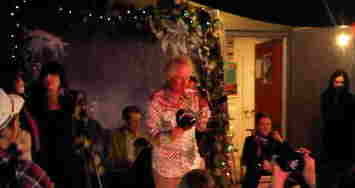
When songwriters Patrick Campbell-Lyons and Alex Spyropoulos started calling themselves Nirvana back in 1967, they thought they were just blending into the Brit paisley guru tapestry that enveloped them at the time. But it's odd how the mystic karma revolved. When Campbell-Lyons was strolling a Los Angeles street last year, a mural of the Dalai Lama made him flash on his early Salvador Dali obsession, and he retained the Dalai-Dali connection for the title and cover of his newest album, "The 13 Dalis." Making public appearances for the first time in four decades after publishing his 2009 "Psychedelic Days" memoir, Campbell-Lyons found his vibrations resonating with a rainbow of flower children old and new. So he was scarcely surprised when, setting up for a reading and performance on the back patio of the Echo Park bookstore Stories, he glanced up at the wall and beheld a weathered mural of a four-armed Hindu deity. Then he consulted his six-song set list, at the top of which stood the title of his first Nirvana hit: "Tiny Goddess." Goodness, how the goddess had grown.
As Campbell-Lyons read from "Psychedelic Days," his flowing Irish accent made being pissed on by a tripping nymph and splattered with paint by Dali seem hardly more than teatime etiquette. When he broke for a sip of Earl Grey, comedian S. Rachel Lovey regaled the audience with tales of her Earthlight Theater performance at the 1969 Woodstock Festival.
Like everything else about Campbell-Lyons' art, his concept for the evening's Nirvana set had expanded. In addition to Jessica Catron rocking the world on cello, Andrew Sandoval seriously strumming guitar and cult songwriting legend Kristian Hoffman posing erect behind an electric harpsichord, we were treated to the vocal duo of Rachel Lichtman and Tiffany Anders providing the atmospheric whoo-whoos.
Thus supported, Campbell-Lyons' feathery voice rode a remarkably accurate rendition of the classical-vaudevillian "Tiny Goddess." When the seams began to unravel on the clever "I Believe in Magic" ("I've got something I keep to myself, and I'm not going to tell you what it is"), he pulled the beat together by heaving heartily on hand shakers. "Pentecost Hotel" wafted all the poetic sun and shadow you could hope for. Hoffman pretended to grimace with effort as he essayed the waltzy rhythm of "You Can Try It." Campbell-Lyons closed with "The Touchables (All of Us)," which he said might apply to the present time, when many can identify with the lyric's yearning for some kind of destination.
The globe-trotting Campbell showed special affection for the old-timey "Life Ain't Easy," which never saw daylight until it surfaced as a bonus track on a 2003 reissue of Nirvana's innovative 1967 concept album, "The Story of Simon Simopath." "Life ain't easy," he crooned, "when you're not there; life ain't easy when you're everywhere." He made it seem pretty easy, though.
PHOTO BY DOLLY DALI.
